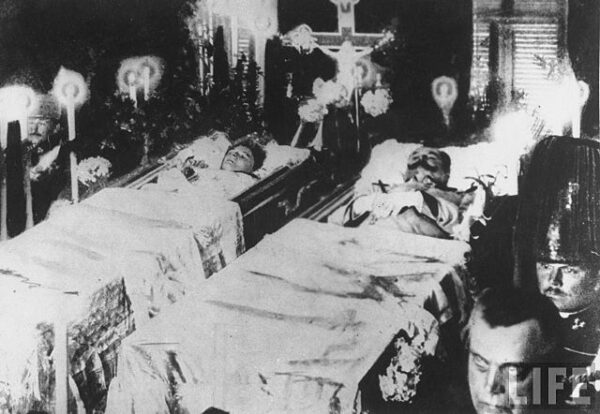On June 28, 1914, the world changed forever when Archduke Franz Ferdinand of Austria was murdered in Sarajevo. Ferdinand was the heir to the Austro-Hungarian throne, and his assassination by a Bosnian Serb nationalist, Gavrilo Princip, set off a chain of events that led to a global war and millions dead. The assassination occurred during a time of rising tensions in Europe, with rivalries and conflicts between major powers reaching a boiling point.
The assassination of Ferdinand and his wife, Sophia, happened almost accidentally and after what can only be described as a tragic comedy of errors.
The Smithsonian Magazine writes, “Armed with bombs and pistols supplied by Serbian military intelligence, seven conspirators position themselves at intervals along the archduke’s route. The first to strike is Nedeljko Cabrinovic, who lobs a hand grenade toward Franz Ferdinand’s open touring car. But the grenade is an old one, with a 10-second fuse. It bounces off the limo and into the road, where it explodes under the next vehicle in the motorcade. Although several officers in that car are hurt, Franz Ferdinand remains uninjured. To avoid capture, Cabrinovic drains a vial of cyanide and throws himself into a nearby river—but his suicide bid fails. The cyanide is past its sell-by date, and the river is just four inches deep.
The bombing throws the rest of the day’s plans into disarray. The motorcade is abandoned. Franz Ferdinand is hurried off to the town hall, where he is due to meet with state officials. Disconsolate, the remaining assassins disperse, their chance apparently gone. One of them, Gavrilo Princip, heads for Moritz Schiller’s delicatessen, on Franz Joseph Street. It’s one of Sarajevo’s smartest shopping destinations, just a few yards from the bustling through road known as Appel Quay.
As Princip queues to buy a sandwich, Franz Ferdinand is leaving the town hall. When the heir gets back into his limousine, though, he decides on a change of plan—he’ll call at the hospital to visit the men injured in the grenade blast.
There’s just one problem: the archduke’s chauffeur, a stranger to Sarajevo, gets lost. He swings off Appel Quay and into crowded Franz Joseph Street, then drifts to a stop right in front of Schiller’s.
Princip looks up from his lunch to find his target sitting just a few feet away. He pulls his gun. Two shots ring out, and the first kills Franz Ferdinand’s wife, Sophie. The second hits the heir in the neck, severing his jugular vein….Inside Schiller’s deli, the most important sandwich in the history of the world lies half-eaten on a table.
Ferdinand’s death served as a catalyst for the complex web of alliances and rivalries among European powers. Austria-Hungary saw the attack as an act of aggression by Serbia and issued an ultimatum that was deliberately designed to be rejected. When Serbia failed to comply with all the demands, Austria-Hungary declared war, sparking a series of military mobilizations and declarations of war between various countries who had tied themselves together through alliances.
The shocking act of violence against a European leader sent shockwaves throughout Europe and triggered a diplomatic crisis that led to World War I.
As the conflict escalated, nations aligned themselves into two opposing sides, the Central Powers and the Allies, setting the stage for the for millions to fight and die in the trenches as world unleashed a new kind of mechanized warfare.
Princip’s appetite for a sandwich shaped the course of history. Not only did his two bullets spark a world war, but it also accelerated the decline of the Austro-Hungarian Empire and ruined several other European monarchies. The June 28, 1914, assassination of Franz Ferdinand remains a stark reminder of how one act of violence can have profound and terrible consequences, forever altering the course of events across the planet.



